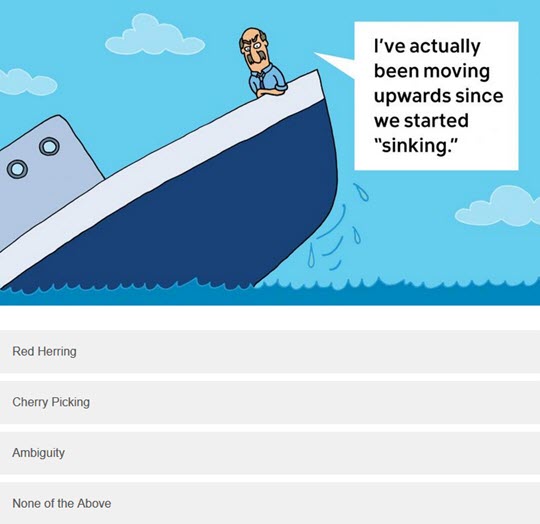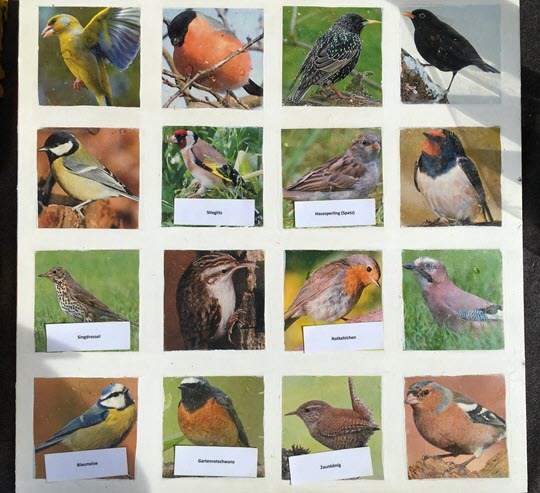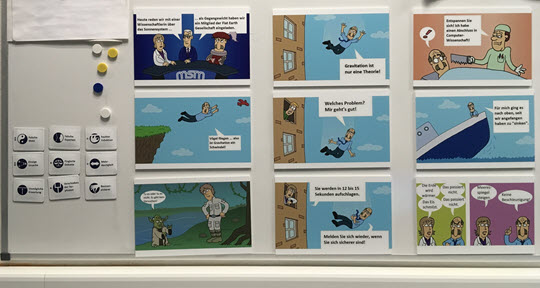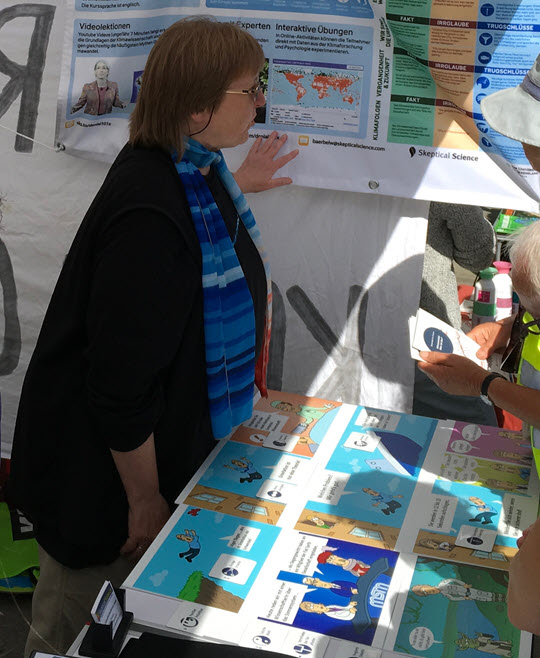Using fallacy cartoons in a quiz
Posted on 25 September 2019 by BaerbelW
Did you do any of the fallacy quizzes John Cook posted recently? If not, you can still access them via his tweet. Starting with quiz4, John used some of his cartoons in the quizzes asking which fallacies they represented. Here is the first example:
 Do you know which - if any - fallacy the cartoon depicts?
Do you know which - if any - fallacy the cartoon depicts?
John also shared some of these fallacy cartoons and questions on social media and they - just like his quizzes overall - proved to be very popular.
While John was publishing his quizzes, I was preparing for a workshop I was going to lead at the K3 conference in Karlsruhe, Germany. I already had a presentation about misinformation ready to go but still needed an activity the participants could work on in teams during the workshop. There had to be a way to make use of the quiz questions and especially the cartoons in order to liven things up a bit, right? This was when my activities as a volunteer docent at the Zoological and Botanical Garden "Wilhelma" proved helpful as it gave me an idea of what to do: create a "match-up" game!
Part of our offerings at the zoo are touch tables where we have topical materials for a given subject like songbirds, edible plants or endangered species to name just three. We often put together a short quiz for the visitors with about 10 to 12 questions and answers they can leaf through on their own to test their knowledge. In addition, we have some match-up games where visitors for example match a songbird's picture with its name or pictures of animal eyes with the species or edible plants with the finished product (think cocoa or coffee beans, vanilla, pepper and many others).
 Matching-up birds and their names
Matching-up birds and their names
So, how about matching cartoons to fallacies in such a match-up activity? Could this work? I suggested the idea to John who liked it and provided the fallacy cartoons he had already included in the quizzes as well as the fallacy icons. Looking for options of how to actually create the quiz material I happened upon a neat offering at an online printing service: print the 9 cartoons on sturdy material with a little magnet at the back and the icons as fridge magnets! This offered various options of how to present the quiz: flat on a table or put up on a whiteboard like shown here (with German texts):
 Fallacy cartoons and icons on a whiteboard (click here for larger version)
Fallacy cartoons and icons on a whiteboard (click here for larger version)
After some ad hoc tests with friends and colleagues, the first chance to actually use the quiz for real was at the booth of Scientists for Future (S4F) in Stuttgart at the big rally as part of the Global Climate Strike on September 20. For the booth we obviously didn't have a whiteboard but we had tables and the cartoons and icons luckily fit nicely on one of them:
 Fallacy Quiz at the S4F booth in Stuttgart, Germany
Fallacy Quiz at the S4F booth in Stuttgart, Germany
Not too surprisingly, people were drawn towards the cartoons and many tried to tackle the quiz. With some help - including the definitions for the fallacies depicted in the cartoons - the matching-up worked out okay although the activity was deemed fairly difficult by some of the passers-by. It's therefore most likely not suitable as a "do-it-yourself" activity but one which needs a helping hand and explanation here and there.
The second chance to use the quiz was during the workshop at the K3 conference where I had worksheets at hand for the participants to first match fallacies to cartoons and then to actual statements (mostly) made during speeches in the German Parliament.
All told, these first field trials of the fallacy quiz were successful as far as I can tell - but then, I'm obviously "somewhat" biased!
Note: if you‘d like to replicate the interactive quiz, you can download the needed material as a PDF-document. You can find the definitions for all the fallacies at the top of Quiz8.































 Arguments
Arguments































Fun quiz. I got 14/15 correct 8^}. Do I have to be a Twitter user to find out the aggregated results?
Where's the fallacy cartoon about Mont Blanc?
Well-done, as always!
I know this post is a bit old now, and I hate to split hairs, but, I think that you have misunderstood some of John's material.
As much as I love the idea of this toolkit, and am grateful to you for making it available, (I thought about using it at a Transition Town Meeting), I think it needs some small corrections.
Logical Fallacies are a subset of Science Denial Techniques. You have listed all of the Science Denial Techniques as a "Taxonomy of Logical Fallacies", not just the Logical Fallacies.
Fake Experts, Fake Debate, Impossible Expectations, Moving the Goalposts, Cherry Picking and Slothful Induction, are not Logical Fallacies.
Thank you again.
@agno - #4
Thanks for your feedback and sorry that I didn't see your comment earlier. The taxonomy used is actually John's and he has been working on it for quite a while and with some critical thinking experts from the University of Queensland. They published a paper in 2018 about how denialist arguments can be taken apart with critical thinking techniques and their supplementary material has definitions for the logical fallacies they found, including most of the ones you list. Does that help?
Cheers
Baerbel